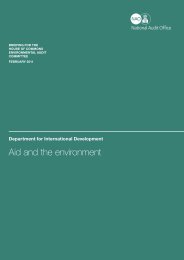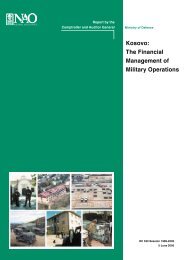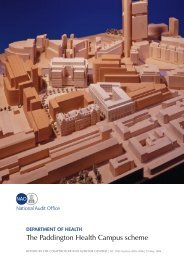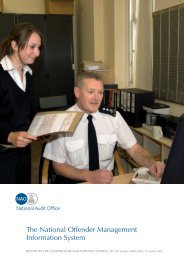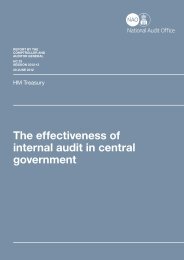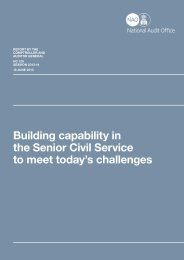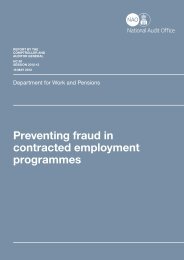Reducing bureaucracy for public sector frontline staff: Briefing for the ...
Reducing bureaucracy for public sector frontline staff: Briefing for the ...
Reducing bureaucracy for public sector frontline staff: Briefing for the ...
You also want an ePaper? Increase the reach of your titles
YUMPU automatically turns print PDFs into web optimized ePapers that Google loves.
10 Part One <strong>Reducing</strong> <strong>bureaucracy</strong> <strong>for</strong> <strong>public</strong> <strong>sector</strong> <strong>frontline</strong> <strong>staff</strong><br />
1.4 There is also a high level of press and <strong>public</strong> interest in <strong>the</strong> time spent by <strong>frontline</strong><br />
workers on administrative tasks. Public opinion seems to be generally that <strong>the</strong> volume<br />
of <strong>bureaucracy</strong> is too high. For example <strong>the</strong>re have been several press articles on <strong>the</strong><br />
amount of time spent by teachers and by police on administrative tasks.<br />
1.5 To date <strong>the</strong>re has been no systematic quantification of <strong>the</strong> costs that complying<br />
with regulation imposes on <strong>frontline</strong> workers. However a few Departments have<br />
produced <strong>the</strong>ir own estimates of <strong>the</strong> time spent on administration <strong>for</strong> some groups of<br />
front-line <strong>staff</strong> (Figure 2).<br />
1.6 More is known about <strong>the</strong> irritations <strong>frontline</strong> <strong>staff</strong> have often faced in dealing<br />
with <strong>bureaucracy</strong>. Common irritants recorded by <strong>public</strong> <strong>sector</strong> <strong>staff</strong> in 2007-08<br />
included a lack of coordination and data sharing between Departments, duplicate<br />
in<strong>for</strong>mation requests, longwinded processes and lack or poor use of in<strong>for</strong>mation<br />
technology (Figure 3). Many of <strong>the</strong> irritants below are now being addressed by <strong>the</strong><br />
Departments concerned.<br />
1.7 A large number of bodies with slightly differing requirements can lead to<br />
perceptions of <strong>bureaucracy</strong> in major service delivery <strong>sector</strong>s. For example one<br />
individual in higher education commented in an online suggestions portal <strong>for</strong> <strong>staff</strong> that:<br />
‘A significant number of organisations regulate Universities, all with different and often<br />
duplicated data requirements and inspection regimes’ 4 Complex delivery chains and <strong>the</strong><br />
role of professional bodies often exacerbate <strong>the</strong> number of data requirements. Annex 1<br />
shows <strong>the</strong> number of organisations involved in delivering <strong>the</strong> skills agenda to young<br />
people in higher education in 2008 and <strong>the</strong>ir roles and responsibilities.<br />
Figure 2<br />
Estimates of time spent on administration by <strong>frontline</strong> workers<br />
Policing: An annual activity based costing data exercise found that <strong>the</strong> police spent about half of <strong>the</strong>ir<br />
time on <strong>frontline</strong> policing (excluding incident related paperwork) and aproximately a fur<strong>the</strong>r 10 per cent of<br />
time on incident related paperwork. Although <strong>the</strong> overall time spent on <strong>frontline</strong> policing increased from<br />
63.6 to 64.9 per cent between 2003-04 and 2007-08, this increase actually represented an increase in<br />
incident-related paperwork (from 10.3 per cent to 12.4 per cent), with time spent on <strong>frontline</strong> policing<br />
excluding incident-related paperwork falling slightly.<br />
Source: HC (2008-09) Written Answers, 15 May, 1088-89W<br />
Education: A 2008 Teachers’ Workload Diary Survey of 2000 teachers in England and Wales found that<br />
full time primary and secondary school classroom teachers spend between 12 and 16 per cent of <strong>the</strong>ir<br />
working week on administrative tasks and school management. The top activity teachers said <strong>the</strong>y would<br />
like to spend less of <strong>the</strong>ir time doing was administration and clerical work (<strong>for</strong> example this was mentioned by<br />
34 per cent of primary full-time classroom teachers).<br />
Source: http://www.ome.uk.com/downloads/2008%20Teachers%20Report%20FINAL.pdf<br />
4 Better Regulation Executive Web Portal: Suggestions <strong>for</strong> Better Regulation http://www.betterregulation.gov.uk/<br />
<strong>public</strong>/viewidea.cfmproposalid=c5f30c366aec4d0691b4fa3e7ec93aba§ion=Public.




